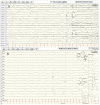Case report: KPTN gene-related syndrome associated with a spectrum of neurodevelopmental anomalies including severe epilepsy
- PMID: 36703628
- PMCID: PMC9871926
- DOI: 10.3389/fneur.2022.1113811
Case report: KPTN gene-related syndrome associated with a spectrum of neurodevelopmental anomalies including severe epilepsy
Abstract
Biallelic variants in the kaptin gene KPTN were identified recently in individuals with a novel syndrome referred to as autosomal recessive intellectual developmental disorder 41 (MRT41). MRT41 is characterized by developmental delay, predominantly in language development, behavioral abnormalities, and epilepsy. Only about 15 affected individuals have been described in the literature, all with primary or secondary macrocephaly. Using exome sequencing, we identified three different biallelic variants in KPTN in five affected individuals from three unrelated families. In total, two KPTN variants were already reported as a loss of function variants. A novel splice site variant in KPTN was detected in two unrelated families of this study. The core phenotype with neurodevelopment delay was present in all patients. However, macrocephaly was not present in at least one patient. In total, two patients exhibited developmental and epileptic encephalopathies with generalized tonic-clonic seizures that were drug-resistant in one of them. Thus, we further delineate the KPTN-related syndrome, especially emphasizing the severity of epilepsy phenotypes and difficulties in treatment in patients of our cohort.
Keywords: KPTN gene; epilepsy; macrocephaly; neurodevelopment delay; splice site variant.
Copyright © 2023 Horn, Danyel, Erdmann, Boschann, Gunnarsson, Biskup, Juengling, Potratz, Prager and Kaindl.
Conflict of interest statement
SB and JJ were employed by Praxis für Humangenetik Tübingen. The remaining authors declare that the research was conducted in the absence of any commercial or financial relationships that could be construed as a potential conflict of interest.
Figures



Similar articles
-
Novel homozygous mutation in KPTN gene causing a familial intellectual disability-macrocephaly syndrome.Am J Med Genet A. 2015 Aug;167A(8):1913-5. doi: 10.1002/ajmg.a.37105. Epub 2015 Apr 5. Am J Med Genet A. 2015. PMID: 25847626
-
KPTN gene homozygous variant-related syndrome in the northeast of Brazil: A case report.Am J Med Genet A. 2020 Apr;182(4):762-767. doi: 10.1002/ajmg.a.61492. Epub 2020 Jan 30. Am J Med Genet A. 2020. PMID: 31999056
-
Pathogenic variants in KPTN gene identified by clinical whole-genome sequencing.Cold Spring Harb Mol Case Stud. 2020 Jun 12;6(3):a003970. doi: 10.1101/mcs.a003970. Print 2020 Jun. Cold Spring Harb Mol Case Stud. 2020. PMID: 32358097 Free PMC article.
-
GRM7-related disorder: five additional patients from three independent families and review of the literature.Eur J Med Genet. 2024 Feb;67:104893. doi: 10.1016/j.ejmg.2023.104893. Epub 2023 Dec 8. Eur J Med Genet. 2024. PMID: 38070825 Review.
-
Developmental and epilepsy spectrum of Poirier-Bienvenu neurodevelopmental syndrome: Description of a new case study and review of the available literature.Seizure. 2021 Dec;93:133-139. doi: 10.1016/j.seizure.2021.10.019. Epub 2021 Oct 27. Seizure. 2021. PMID: 34740143 Review.
References
Publication types
Grants and funding
LinkOut - more resources
Full Text Sources
Molecular Biology Databases

